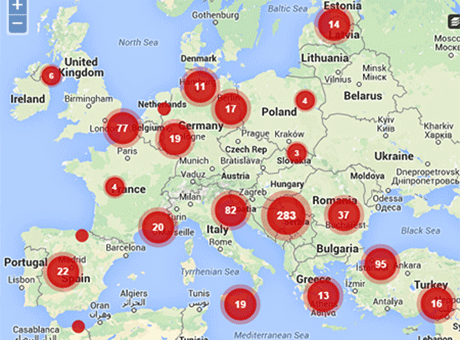29 Apr 2015 | Europe and Central Asia, mobile, News and features
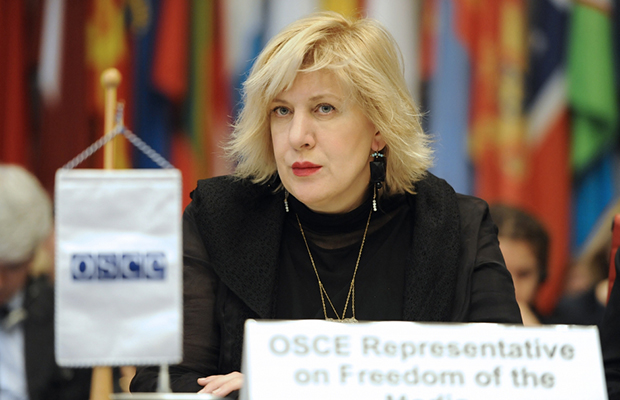
OSCE Representative on Freedom of the Media Dunja Mijatović, at the Permanent Council in Vienna, 16 January 2014. (Photo: OSCE)
Anniversaries and commemorations are times to reflect, judge and move forward. So it is with World Press Freedom Day, which we note for the 22nd time this year amid worldwide evidence of hostility toward the media.
The date of 3 May was set aside by the UN General Assembly in 1993 to foster free, independent, pluralistic media worldwide.
The Organization for Security and Co-operation in Europe, the largest regional security organisation in the world, just four years later in 1997 created the position I now hold, the Representative on Freedom of the Media. The position was established expressly to help countries that are members of the organisation (which includes all of Europe, the countries of the former Soviet Union and Mongolia, as well as the United States and Canada) implement their promises to uphold the rights to free expression and free media.
It is my job to advocate for these two concepts. It is also my job to help, cajole and sometimes plead with the 57 nations in the organisation to simply live up to their promises to provide the environment in which free expression and free media can flourish.
Over the past 18 years only three people have held the position of Representative. As I enter my sixth and last year in this position, the time has come to reflect on the state of media freedom and to analyse the overall health of free expression across the OSCE region.
To do so, I needed a base from which to judge. I found that by returning to the very first public statement issued by the Representative’s office, then headed by German politician Freimut Duve, on 7 September 1998. It announced, ironically, that Duve had been denied a visa by authorities in Belgrade to visit the Federal Republic of Yugoslavia, to lobby the government to change its policy of denying visas to reporters from other countries, some of whom were considered foreign intelligence agents.
The Helsinki Final Act of 1975, the very document that eventually brought the OSCE into existence, expressly called for improving the working conditions for journalists, which included examining “in a favorable spirit and within a suitable and reasonable time scale requests from journalists for visas” and to “grant to permanently accredited journalists…on the basis of arrangements, multiple entry and exit visas for specified periods”.
Duve wrote in the public statement: “Tito himself, as President of the former Yugoslavia, signed in 1975 his country’s acceptance of the principles and commitments of the Conference for Security and Cooperation in Europe.”
Those commitments expressly included the right of journalists to work internationally.
Promises made. Promises not kept.
Have things changed over the years?
The fact that you are reading this posting identifies you as someone well aware of the precarious position journalists and the media find themselves in today. They face a litany of problems, none of which is bigger than the issue of life itself.
The year 2015 hardly had started when eight journalists for the French magazine Charlie Hebdo were murdered in their office in Paris – over the depiction of a religious figure. Two weeks later, a discussion group in Copenhagen convened to talk about the Paris incident came under gunfire with another person killed. So much for free media. So much for free expression.
But we all know that while homicidal violence against journalists is the most drastic form of attack on free media, it is not the only one. Across the OSCE region media is subject to all nature of offences: criminal defamation laws that put reporters in jail for rooting out corruption in public places; cyber-attacks that plague internet media sites; new laws that are being adopted to criminalise free expression in the name of fighting terrorism; and increasing regulation of the internet in an effort by authoritarian governments to squelch media and free expression advocates.
The simple violations of media rights continue, too. In the past 12 months I have written to authorities and issued public statement on at least six occasions condemning the refusal of governments in the OSCE region to grant visas to foreign-based reporters. Have things really changed in 2015 from 1998? Only the countries involved; not the practices.
But even if my judgment on the past 18 years is harsh, media freedom advocates, such as me, must continue to move forward and provide the defenses necessary for free expression and free media to flourish. Complacency is not an option.
Solidarity, however, is.
For example, three rapporteurs on free expression from the United Nations, the Organization of American States and the African Commission on Human and People’s Rights and I annually issue a joint declaration on a topic related to free expression. Those declarations now are seeing their way into decisions of national and international bodies, including judgments of the European Court of Human Rights. This is real progress. Decisions upholding citizens’ rights under Article 10 of the Convention for the Protection of Human Rights and Fundamental Freedoms are real results.
And all of us must continue to raise the issue of the rights of media before national legislatures. Public awareness campaigns on behalf of media can be effective tools to prod elected officials to spend the resources, including political capital, necessary to build environments conducive to free expression. Elected officials and their appointed, often nameless and faceless bureaucrats, can be taught and encouraged to write good laws and appoint good law enforcement authorities, including police, prosecutors and judges, to interpret those laws in a fashion that will provide oxygen for those who champion free expression.
It is easy to become disillusioned and depressed by the daily fare of media issues. We should recognise the perilous state of free media and free expression in many spots in the world. But we never should lose our focus. We should take note of this date and make a personal commitment to stand for the basic human rights of free expression and free media – this year and the next and the years after that.
World Press Freedom Day 2015
• Media freedom in Europe needs action more than words
• Dunja Mijatović: The good fight must continue
• Mass surveillance: Journalists confront the moment of hesitation
• The women challenging Bosnia’s divided media
• World Press Freedom Day: Call to protect freedom of expression
This column was posted on 29 April 2015 at indexoncensorship.org
24 Jun 2014 | News and features, Politics and Society
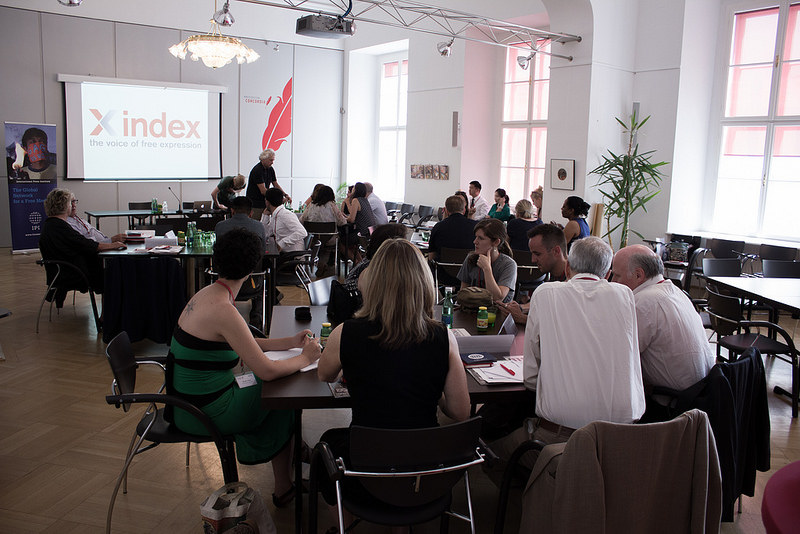
Index speaks at the IAPC meet 2014, Vienna
There has been an 18% rise in violence towards journalists compared to the same period last year, International Media Support, an organisation that works in many of the world’s biggest danger zones, told an international journalism conference.
News from Egypt – as three journalists from Al-Jazeera are sentenced to seven years in prison – demonstrates the huge threats that journalists can face. The subject was covered in detail at this year’s International Association of Press Clubs annual conference in Vienna, which Index on Censorship attended this month.
“Some countries we just can’t work in,” said John Barker from Media Legal Defence Initiative, who help represent journalists facing legal charges for reporting and presented on their work. “Every time we work in Vietnam, for example, the lawyers are arrested. In many places, we can’t transfer money to them.” Nonetheless, they are currently working on 102 cases in 39 countries.
Other topics for discussion included:
- The increasing number of freelancers working in danger zones – and with little training
- How to protect fixers, translators and local journalists
- Possible methods for funding legal representation (Crowdfunding worked as a recent experiment in Ethiopia, said MLDI)
The event was hosted by Austria’s PresseClub Concordia – said to be the oldest press club in the world (founded in 1859 – reformed in 1946, after having its assets seized by Nazis). It was attended by press clubs from around the world, including Poland, Belarus, Syria, the Czech Republic, the US, India, Ukraine, Mongolia, Germany, and Switzerland. Other NGOs – alongside Index, International Media Support and Media Legal Defence Initiative – included the International Press Institute and RISC (Reporters Instructed in Saving Colleagues).
Index was invited to present on the work the organisation is doing around the world, which included sharing the stories of our Freedom of Expression Awards winners and nominees, and news of our current work, including a crowdsourcing project to map media freedom violations across the EU. Plus we also shared stories from our quarterly magazine – including a report on violent threats to journalists in Tanzania and how news stories are getting out of Syria via citizen reports.
Index also hosted round-table discussion on censorship, which provoked an impassioned debate. One of the most interesting topics covered was on contracts that some journalists are being made to sign on what they can and can’t write. We heard of cases in Mongolia and Germany. We also discussed self-censorship and censorship by complying to advertisers’ will. One attendee from the Berlin Press Club said: “There is no censorship in Germany, but journalists feel like they have scissors in their heads. You have to self-censor before you write.” This is an area that we are researching, so please get in touch if you have experiences and examples.
The meeting also visited a new exhibition on censorship during WW1 and ended with the Concordia Press Club’s annual ball, which is a key fundraiser for the club and attended by over 2,000 guests. See photos from the event below.
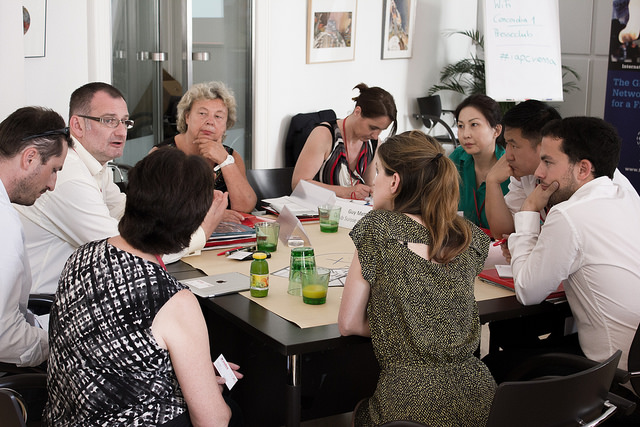
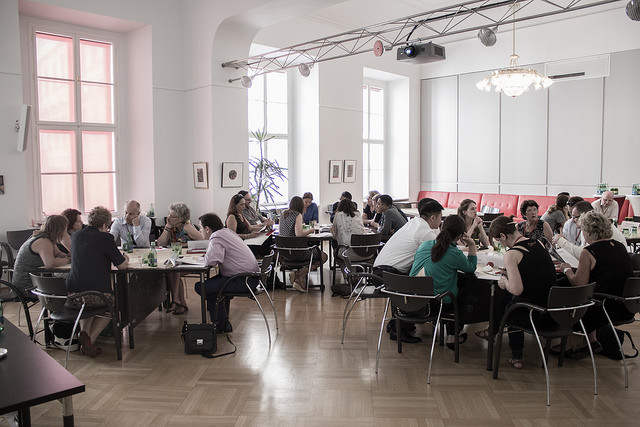
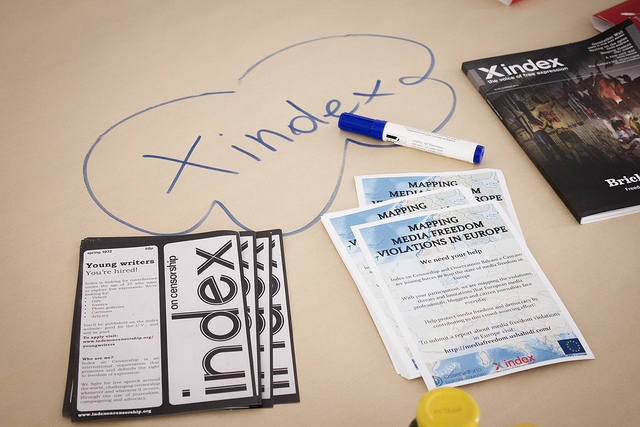
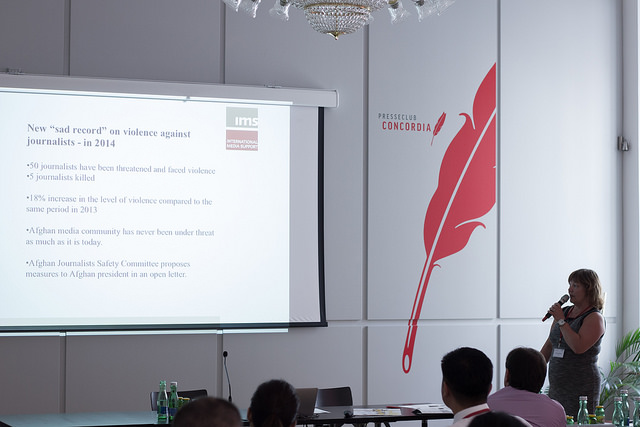

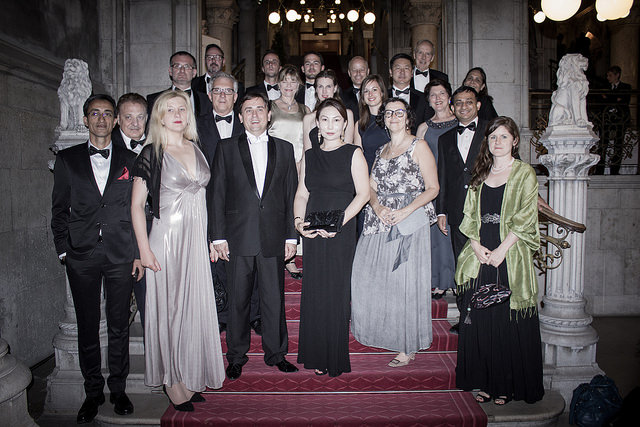
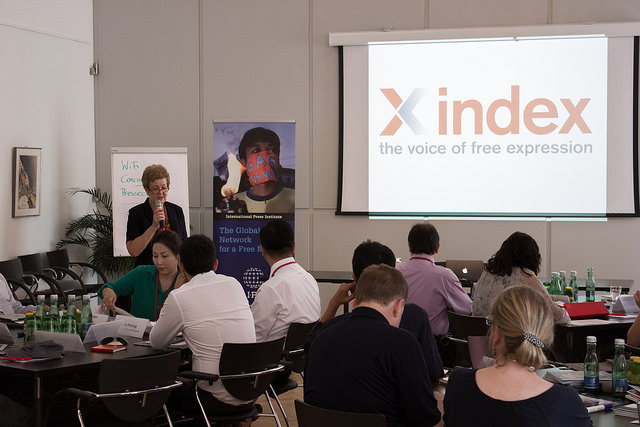
This article was posted on June 24, 2014 at indexoncensorship.org
24 Feb 2014 | Asia and Pacific, China, News and features
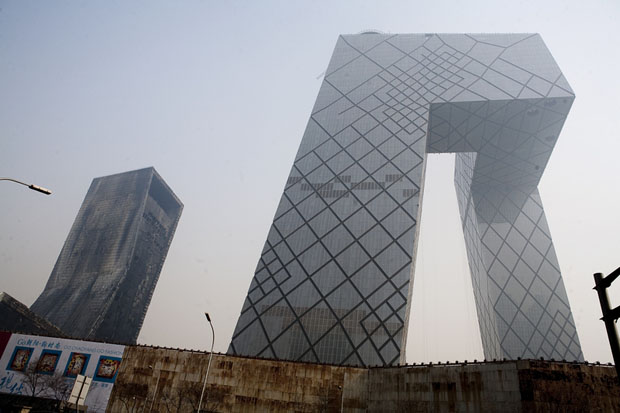
China’s state broadcaster CCTV fired a journalist for criticising its practise of airing live criminal “confessions” (Image: Matthew Niederhauser/Demotix)
In November 2013, Wang Qinglei, a TV producer at the state-broadcaster CCTV, left his office for the last time. “Long-time co-workers lamented with me, ‘Over all these years, there have been editors, reporters, producers, and directors who have been suspended because of stories, but you are the first producer who has been fired for speaking your true feelings! What is wrong with CCTV these days?'” he later wrote.
“In the space of a year, we get upwards of a thousand propaganda orders,” Wang had controversially vented on an internet forum prior to his dismissal. “We should ask ourselves: How many of these orders were issued in the national interest, and how many were issued to serve the political and economic interests of some individual, group or leader?”
His comments sparked alarm amongst the authorities. They had just passed laws forbidding citizens from exploiting the media to spread unfounded rumours and libellous claims, a strategy which most suspected was more covert censorship than genuine concern.
The open letter that he posted online, which CCTV would subsequently fire him over, focused on a new practice of airing live criminal “confessions.” State-owned CCTV had been broadcasting dramatised admissions by petty criminals for years, in an attempt to win new viewers, but in recent months, a string of high-profile political suspects had also been made to confess to crimes on air. The suspects are often filmed handcuffed and wearing jump suits. The footage is designed to be humiliating. The practice is ongoing.
Chinese-American Charles Xue, a social media celebrity and successful venture capitalist, had been amongst the first victims of the tactic, just two months previously. He “confessed” to having been “in a negative mood” while tweeting criticisms of the government, admitting that his thoughts were “a neglect of the social mainstream.” Separately, the authorities had arrested him for consorting with prostitutes, charges which some say are fabricated.
As Wang put it, when decrying the TV confessions in his open letter to CCTV executives: “We abused the public institution of media to wantonly bombard an individual indiscretion. Journalistic integrity and professionalism were nowhere to be found.”
The ironies of the circumstances surrounding Xue’s confession were either unintended or highly cynical. While the Chinese authorities are still having trouble taming the internet, the government remains in control of print and TV media.
Footage of Xue’s confession, for example, was widely discussed by Chinese TV and print outlets, whose freedom of expression is heavily limited by state involvement. Meanwhile, Xue’s online media presence was rapidly disappearing. Mentions of previous campaigns on microblogging site Weibo were removed. Wang’s open letter to CCTV, the one which had got him sacked, was also removed. Directives issued from the Ministry of Information detailed how links to any of the content would result in arrests.
Wang, and other critics of the policy, argued the on-air confessions, forced on high-profile enemies of the state such as Xue, were an unfair skip round a proper judicial process. Human rights lawyers and even some Communist Party officials have condemned the practice. The confessions sit alongside new legislation that forbids what the government call online “rumour mongering,” and allows anyone who retweets an “unfounded rumour” to be arrested. Thousands have now been arrested, including several high profile “social media celebrities.”
State newspapers say the new laws to control “rumour mongering” are necessary: “The Internet has grown into an easily accessible platform for the Chinese public, an increase in crimes such as defamation and blackmail has occurred online over the past few years.”
Indeed, authorities were quick to link Charles Xue’s arrest with those of Qin Zhihui and Yang Xiuyu – two so-called “black PR” professionals. Xue had allegedly invested in their controversial public relations outfit.
“Black PR” is a rapidly growing sector in China – which polishes the online reputation of celebrity and corporate clients – while spreading malicious rumours about their enemies. Rumours started by Qin and Yang were often fabricated, sometimes falsely accusing CEOs of infidelity, or involvements with prostitutes and causing a significant scandal when they effectively destroyed the Chinese Red Cross’ reputation, over made up allegations of sexual impropriety amongst senior officials at the organisation. The pair employed a 15,000 strong portfolio of online personalities to help spread their rumours – known as a “water army.”
Yet industrial smearing from the pair had gone unchecked for years — the government simply wasn’t interested in the malicious rumours Qin and Yang routinely disseminated. In fact, it was only when Qin and Yang’ decided to attack a senior Communist Party official, Lei Feng, that new “rumour mongering” legislation was suddenly used to arrest the pair. They now face long jail sentences.
Charles Xue, who was accused of backing the pair financially when he was arrested, has long been of interest to the party apparatus. As a young man, his father was imprisoned by Mao Zedong, and Xue was forcibly exiled to the countryside, put to work in attempt to reduce the threat he, and other academics, supposedly posed to communism. His outlook since the effective imprisonment has been increasingly international – as a young man he quickly learned English, did some translation work of American texts for publication in China, and travelled to Stanford to study.
In recent years, Xue has amassed not only vast wealth through his various business enterprises, but also several million followers on social media. He leverages this considerable audience for awareness campaigns around issues such as clean water, kidnapping and human rights. He also speaks passionately about the potential for Weibo to affect change.
The irony of the state abusing their control of TV and print to control those who “abuse” the media online has also been noted by local Chinese observers. Government bodies “spreading falsehoods” have come in for focussed criticism. Activists simply ask “why are men like Charles Xue being arrested, when the authorities regularly spread false rumours themselves?”
For example, an article about the Beijing police in a state-run newspaper, which reported on a supposed new crackdown on prostitution, was quickly identified as a fake. The article was in fact a repeat of an identical piece published several years earlier, which had simply been reprinted with a new date at the top.
Critics also called out newspaper Xinhua, when they mistakenly announced that Istanbul had been awarded the 2020 Olympic Games, instead of Japan. The authorities, who effectively operate Xinhua, were extremely embarrassed by the editorial hiccup. Yet no arrests at Xinhua have yet been made, over this Olympic-sized mistake.
International media has been suggesting Weibo is being”neutered” as a result of the new anti-rumours crackdown – with people too scared to use it. But newer analysis of online conversations since the legislation has been passed has revealed something strange. Record numbers of Chinese netizens are now politically active, in particular chatting about the relatively obscure political ideology “constitutionalism.” Constitutionalism is a reformist movement that advocates tying the Communist Party to a constitutional framework. In Weibo terms, the volume of conversations is enormous: there are currently twice as many microblogs referring to “constitutionalism” as were being made around the time of the Jade Rabbit moon landing. The Chinese foray into space held the previous record for most microblogs on a single topic, the analysis showed.
But on balance, the laws are chilling. The arrest net the “anti-rumours campaign” has thrown is big, with thousands already in custody. In politically troublesome Inner Mongolia, the state has made fifty arrests. And the firing of Wang Qinlei at CCTV will shake employees at state-owned media outlets, but also “social media celebrities” who are contemplating effecting social change online. The sacking starkly shows how the Communist Party stands behind CCTV as a broadcaster: endorsing public confessions to made-up crimes, as an agent of the state. Criticism of these public confessions will not be tolerated — instead it will be destroyed. And consider the “victim” of the confession, Charles Xue. Trumped up prostitution charges were probably difficult to explain to his wife. His kids won’t remember fondly, watching their dad on TV, confessing to being an enemy of the state. Nor the bullying that goes on in the school yard afterwards. The gossip and rumours behind his family’s back. “Saving face” is an all-important concept in China: public humiliation is the antithesis of that. Televised confessions, an unsettling and bizarre spectacle, are making even the most influential scared to speak out.
This article was posted on 21 February 2014 at indexoncensorship.org
7 Dec 2012 | Volume 41.04 Winter 2012
Between February 2011 and June 2012, I attended nine surveillance technology trade shows around the world. At these events, vendors, developers and government agencies meet, mingle and do business. They’re usually held at anonymous corporate hotels and are strictly invite-only. Yet the atmosphere is usually one of pervasive paranoia and attendees often conceal their real names and governmental affiliations. The sales representatives, by contrast, can be extremely frank, particularly when discussing the ethical implications of their trade. During one presentation, delegates from a password forensics company projected an image of a metal interrogation chair draped with chains and joked that their equipment could be used in conjunction with ‘other methods’. Another vendor told me that he was sure his company could come to ‘some arrangement’ with a (hypothetical) North Korean customer. Fat profit margins are top of the agenda; ethics and social responsibility rarely even come into it.
Twenty years ago, the value of the global surveillance industry was negligible – today it is estimated to be worth around $3bn. The fall of the Berlin Wall in 1989 left hundreds of Stasi officers out of a job and the rash of new surveillance companies that sprang up in the early 1990s in Germany suggests that many found lucrative new employment in the private sector. Privacy International published a report in 1995, highlighting this increased flow of surveillance tools from developed countries like the UK, the US, Germany and Israel to repressive regimes in Africa and South Asia, where they were then used as instruments of political control and internal repression. But not a single Western government has felt it necessary to impose export controls on surveillance technologies, and so this unethical trade has therefore continued unimpeded.
After 9/11, governments around the world ramped up their surveillance operations and private companies competed to develop and supply cheaper and more invasive tools. The business of surveillance was no longer the preserve of large military and arms manufacturers like BAE Systems; small technology enterprises and larger Silicon Valley companies quickly flooded the market. Privacy International’s recent research has identified around 250 vendors of surveillance technology based in 33 countries around the world and there are probably dozens more that have managed to remain under the radar. Unfortunately, these new actors seem to conduct themselves with even less integrity than their predecessors – exports to Africa and the Middle East are significant and companies now offer bespoke solutions and training to their clients.
One would think this would make it difficult to plead ignorance when companies get caught doing business with dictatorships and repressive regimes. Yet this is still the most common defence: companies claim that they had no knowledge of the uses to which their products were being put.
They deny complicity in resulting human rights abuses – censorship, torture, extrajudicial detention and executions – because they say that technology is neutral, that it’s not their responsibility to vet their clients, that they can’t control how equipment is used once sold. Let us be clear: in the majority of situations, this is simply not the case. These companies are not staffed by idealistic young software developers creating socially useful tools that their wicked clients are then misusing and perverting. In fact, most of the time they are working with their customers on a close and long-term basis, carefully tailoring surveillance systems to specific needs.
Milan-based Area SpA last year furnished Privacy International with a disturbing example of just how committed to customer service these companies can be. While President Bashar al Assad’s forces were engaged in brutal attempts to crush dissent in Syria, killing and injuring hundreds of unarmed protesters, Area secretly installed a nationwide mass surveillance system. Dozens of the company’s Italian employees were flown out to Syria to install hardware and software that would allow Syrian security agents to follow targets on flat-screen workstations displaying communications and web use in near-real time, alongside graphics that mapped citizens’ networks of electronic contacts. The €13m (US$16.7m) contract also specified that Area employees would supply training to Syrian security agents, teaching them how to monitor vast swathes of the population. Fortunately, after a Bloomberg report exposed the project and protesters gathered outside Area’s offices, the company quietly pulled the plug on the project.
The effect of a surveillance system of this sophistication and magnitude on political dissent, public debate, the rule of law – in fact, on all of the processes fundamental to participatory democracy – is devastating. When people see their friends and colleagues arrested and tortured because of a text message, a Facebook chat or a phone call, they think twice about complaining about government abuses. They may cut off all phone and email contact with those people, afraid that just being part of the wrong networks will bring the secret police to their own doors in the middle of the night. Arranging face-to-face meetings becomes practically difficult, and even speaking in person isn’t secure – governments can target individual mobile phones with malware that allows them to remotely control the device’s microphone and camera and thereby see and hear everything happening around it.
Organising political demonstrations is equally challenging. Blogs containing anti-government sentiments are identified and blocked almost as quickly as they can be written, preventing citizens from expressing their dissatisfactions to a wider audience. Surveillance technology is therefore one of the most powerful weapons in the dictator’s arsenal; it destroys political opposition and subdues populations far more effectively than guns or grenades.
Privacy International doesn’t think it’s right that companies based in Europe and the United States – where governments publicly condemn the kind of human rights abuses described above – should make vast sums of money by facilitating these same abuses. We also believe that this notoriously murky and elusive industry needs to be much more transparent about which products are being sold to which regimes, particularly in Africa and the Middle East. We embarked on the Surveillance Industry Index – a publicly-accessible online catalogue of surveillance companies, products and marketing materials – because we felt that putting the hard facts in the public domain would hopefully stop companies obfuscating their involvement with repressive governments and make them more accountable. We also hoped that it would add to the evidence base for proper export licensing systems in Europe and the US. In particular, the excerpts from the marketing material we’ve presented provide direct insight into the ethical vacuum at the heart of the industry and demonstrate the terrifying scope and power of some of the technologies that are now readily available.
For example, UK-headquartered Gamma Group describes one of their products as permitting ‘black hat hacking [illegal and malicious] tactics to enable intelligence services to gather information from target systems that would be otherwise extremely difficult to obtain legally’. South African VASTech sells a mass surveillance product that can intercept ‘more than 100,000 simultaneous voice channels, allowing it to capture up to one billion intercepts per day and storing in excess of 5,000 Terabytes of information’. Madrid-based Agnitio is even more explicit, stating that their product is ‘designed for mass voice interception and voice mining’. Mass surveillance has been ruled illegal in most democratic countries as, by its very nature, it can never be considered a proportionate or necessary tactic.
Over the past few years, Gamma International’s FinFisher suite, a range of spyware that covertly takes remote control of a computer or mobile device, copying files, intercepting Skype calls and logging every keystroke, has appeared all over the world. Recent reports by computer security company Rapid7 have placed FinFisher command and control servers in Australia, the Czech Republic, Dubai, Ethiopia, Estonia, Indonesia, Latvia, Mongolia, Qatar and the US. A separate investigation in August by CitizenLab, an interdisciplinary project based at the Munk Centre for International Studies at the University of Toronto, identified potential FinFisher command and control servers in Bahrain, Brunei, the Czech Republic, Ethiopia, Indonesia, Mongolia, Singapore, the Netherlands, Turkmenistan and the United Arab Emirates.
Gamma International’s Managing Director, Martin J Muench, has refuted this research – the latest in a long line of denials and excuses from the company. In April 2011, the Guardian reported that two Egyptian human rights activists had found a proposal from Gamma to supply President Mubarak’s regime with FinFisher products inside the ransacked headquarters of the State Security Investigations service. The company said the offer was for a free trial version and that ‘Gamma International UK Limited has not supplied any of its FinFisher suite of products or related training etc to the Egyptian government’. When it was reported that five Bahraini human rights activists had been sent emails containing FinFisher trojans, Gamma suggested that the malware in question was a ‘copy of an old FinSpy demo version’ that ‘may have been stolen’. Muench also tried to point the finger at organisations that had been investigating Gamma’s practices: ‘It’s been suggested that the information was stolen on behalf of a pressure group to disrupt our business but I have no evidence yet to support that claim.’
Yet Muench’s ultimate defence is that Gamma always complies with British, American and German export regulations, recently stating that ‘Export Control Authorities … act as our moral compass’. This would be all well and good – if such export regulations existed anywhere in the world. In fact, exports of surveillance technologies remain almost entirely unlicensed and thus uncontrolled. It should also be noted that, although Gamma has been using the above justification since April 2011, the company only bothered to submit a technical information about FinFisher to the Department for Business Innovation and Skills (BIS) in June 2012. BIS, which is responsible for licensing exports in the UK, has now decided that exports of FinFisher should in fact be licensed, on the basis that the product contains cryptography.
However, the British government has thus far refused to include other surveillance tools in the export-licensing regime, apparently buying into the industry’s claims that these products are all sold for legitimate purposes. Yet BIS controls exports of hundreds of ‘dual-use’ products (products that can be used illegally or dangerously as well as having a legitimate or civilian purpose) and the industry has thus far demonstrated a woeful inability to self-regulate. Unless surveillance exports are effectively controlled by law, the action the UK has taken on Gamma’s FinFisher will be just a sticking plaster on a bullet wound. Though the European Parliament passed a resolution calling for stricter oversight of surveillance technology exports and President Obama announced an executive order to prevent such exports to Syria and Iran, there has not been any clear, decisive action as of yet. And, for dissidents and ordinary citizens alike, the space for speaking out about human rights violations and ensuring this information gets out to the wider world is narrowing all the time.
©Eric King
41(4): 81/86
DOI: 10.1177/0306422012465540
This article appears in Digital Frontiers, the winter 2012 edition of Index on Censorship magazine.

